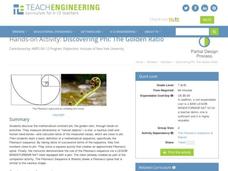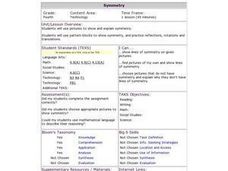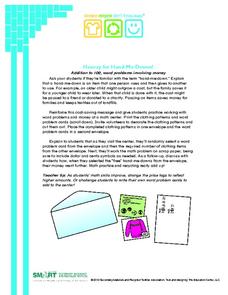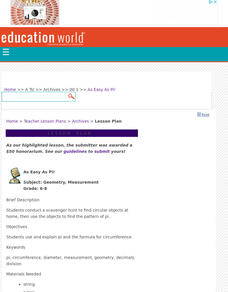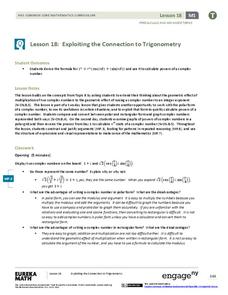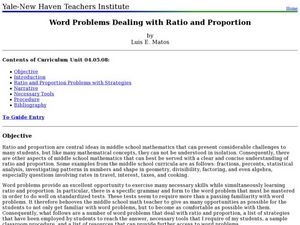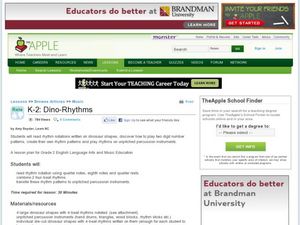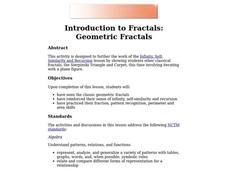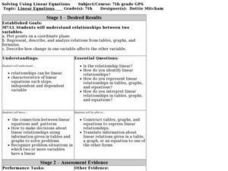World Wildlife Fund
Take 6
Investigate the various properties of the number six with this elementary math lesson plan. From simple addition, subtraction, multiplication, and division problems to the creation of hexagonal tessellations, this lesson plan covers all...
Teach Engineering
Discovering Phi: The Golden Ratio
Fe, phi, fo, fum. This activity leads pairs to find the ratio of consecutive terms of the Fibonacci sequence. The pairs find that the Fibonacci sequence can be found in many places. A discussion with the class shows that the ratios...
Curated OER
Patterning Pictorial
First graders describe and create simple patterns. They identify patterns in the environment. They extend and reproduce patterns.
Curated OER
Patterns in Fruits and Vegetables
Students predict, examine and record the patterns in a variety of fruits and vegetables.
Curated OER
Math/Technology: Symmetry
Fourth graders, using KidPix, use stamps and pencil tools to illustrate which pictures have symmetry. They add text boxes to explain their answers in math terms. Students practice skills in rotation, reflection, and translation on an...
Curated OER
Range, Cluster, Gap and Outliers
There are a number of activities here where learners collect and record data, as well as, activities where the likelihood of an event happening is calculated given the experimental probability. Young statisticians organize information...
Curated OER
Hooray for Hand-Me-Downs!
Youngsters learn how "hand-me-downs" can help save money while practicing math word problems with this fun learning center activity.
Curated OER
Investigating Square and Triangle Numbers
Fifth graders build increasingly larger squares and triangles using pattern blocks. They record the growth patterns on a chart and look for corresponding numerical patterns. Students describe the patterns they find and use them to...
EngageNY
Building Logarithmic Tables
Thank goodness we have calculators to compute logarithms. Pupils use calculators to create logarithmic tables to estimate values and use these tables to discover patterns (properties). The second half of the lesson plan has scholars use...
Curated OER
As Easy As Pi!
Middle schoolers conduct a scavenger hunt to find circular objects at home, then use the objects to find the pattern of pi.
EngageNY
Analyzing Residuals (Part 1)
Just how far off is the least squares line? Using a graphing calculator, individuals or pairs create residual plots in order to determine how well a best fit line models data. Three examples walk through the calculator procedure of...
Alabama Learning Exchange
Place Value Review
Here is a fast-paced addition game which reinforces the concept of place values. Learners view a PowerPoint on place value, then engage in the game using a whole-class format. This is a stimulating, and interesting math game lesson.
Curated OER
Skate Party
Learners use the Frayer model during problem solving. In this problem solving lesson, they examine multiple methods of data collection to solve real world problems. Resources are provided.
EngageNY
Exploiting the Connection to Trigonometry 1
Class members use the powers of multiplication in the 19th installment of the 32-part unit has individuals to utilize what they know about the multiplication of complex numbers to calculate the integral powers of a complex...
Curated OER
Multiplication Snack Activity
Youngsters study multiplication facts by manipulating food in order to problem solve. They will use healthy snack items as manipulatives to solve various multiplication equations. Charts, tables, physical models, and so much more are...
Curated OER
Word Problems Dealing with Ratio and Proportion
Mindful middle-schoolers read and solve a number of word problems. Learners copy and discuss what they believe their strategies are in solving each problem. They also write their findings and share with the rest of the class.
EngageNY
The Definition of Sine, Cosine, and Tangent
Introduce your classes to a new world of mathematics. Pupils learn to call trigonometric ratios by their given names: sine, cosine, and tangent. They find ratios and use known ratios to discover missing sides of similar...
West Contra Costa Unified School District
Correlation and Line of Best Fit
Computers are useful for more than just surfing the Internet. Pupils first investigate scatter plots and estimate correlation coefficients. Next, they use Microsoft Excel to create scatter plots and determine correlation...
Curated OER
Amazing Fibonacci
Students integrate the patterns of Fibonacci into music. For this geometry lesson, students apply the concepts of recursion, pattern and Phi or Golden Ratio to composing and playing music on various instruments. They lesson is co-taught...
Curated OER
Rainbow Fish: The Copycat Fish Lesson Plan
Students explore the concept of copying one another. In this early childhood lesson plan, students discuss what a copycat is and why people copy one another. Students then discuss the story Rainbow Fish: The Copycat Fish, recording...
Curated OER
K-2: Dino-Rhythms
Second graders read rhythm notation and combine four-beat rhythms. In this rhythms lesson, 2nd graders read quarter notes, eighth notes, and quarter rests in rhythms that are written on dinosaur shapes. They clap, snap, or stamp out the...
Curated OER
Scenario Challenge
Students create a quilt, using different patterns. In this geometry lesson, students apply prior knowledge as they use different patterns to help them create a quilt using transformations and geometric shapes.
Curated OER
Introduction to Fractals: Geometric Fractals
Learners study and observe the patterns made by the areas of the Sierpinski Triangle. Students use the computer to draw two or three iterations to discover the number patterns. Learners complete worksheets based on Geometric Fractals.
Curated OER
Solving Using Linear Equations
Seventh graders explore linear equations. They observe the relationship between linear equations an patterns. Students make decisions using information given in graphs to solve linear equations. They perform a toothpick activity to...

